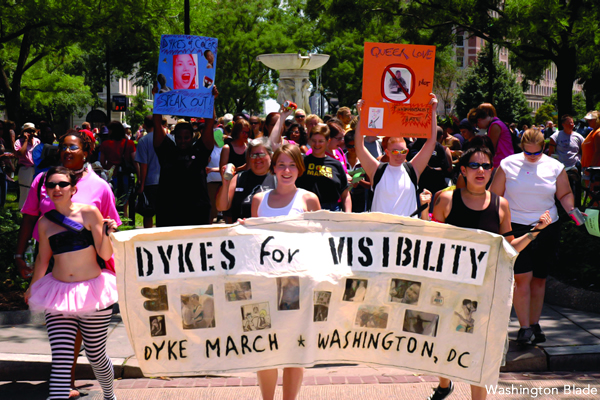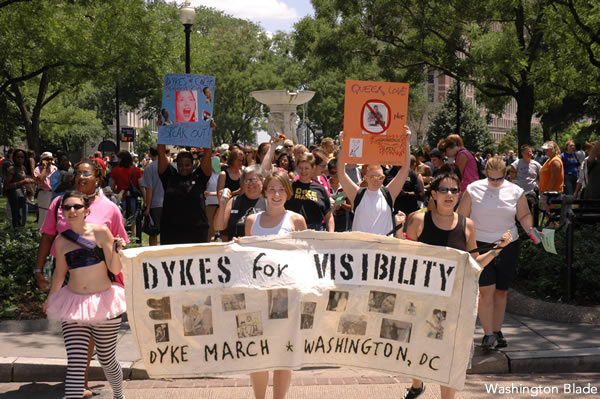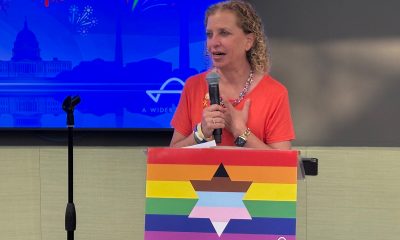Opinions
We don’t have to choose between Dyke and Jewish identities
An inclusive, celebratory, and safe DC Dyke March


We’re Jewish Dykes. We’re Dyke-ish Jews. We don’t have to choose.
We love being Jewish and we love being Dykes. As with all identities there have been paths and twists and turns to reach that conclusion, we had to fight for them and we had to grow to love them, at this point it feels amazing to be able to say both of those things with certainty. Sometimes it feels like we had to come out twice in our Jewish communities, once as Dykes (or really over and over again) and again as self-loving Anti-Zionists.
For that reason, we dedicated time and energy to helping organize the Dyke March as specifically and explicitly Jewish Anti-Zionist Dykes. The Dyke March has been inclusive, supportive and encouraging of our Dyke-y Jewishness and Jewish Dykey-ness. From the first DC Dyke March meeting we’ve been out and proud queer Jewish dykes. Other DC Dyke March organizers have been open and responsive to questions, concerns and ideas we have regarding keeping the DC Dyke March a welcoming space for Jewish dykes. We knew from the start we wanted to be a part of an inclusive, celebratory, and safe as possible Dyke March.
Recently, a Zionist contacted the DC Dyke March with the deliberate goal of making it sound as though Jews are unwelcome at the DC Dyke March — a claim that erases us Jews who have been organizing so heavily. They contacted a number of news organizations including the Washington Post, and the pinkwashing organization A Wider Bridge. A Wider Bridge is the organization that accused the Chicago Dyke March of anti-Semitism in 2017 because of the group’s anti-Zionist stance. The goal of these groups seems to be to paint the DC Dyke March as a place that’s unwelcome to Jews because of our anti-Zionist views.
The claim is that we are banning Jewish symbols, which is entirely untrue. We are asking people to not bring nationalist symbols because violent nationalism does not fit with our vision of queer liberation. And because we need the march to be a space that is as welcoming to Palestinian Dykes as it is to Jewish Dykes. The “Jewish Pride Flag” seemed to only rise in popularity after the Chicago Dyke March — it was never a flag that we felt directly connected to, and it does not represent all Jewish Dykes. The flag is a Star of David placed in the center, superimposed over a rainbow flag, and is almost entirely reminiscent of the Israeli flag, swapping out the blue and white for a rainbow. The star of David itself only became publicly popular as a symbol of Judaism in the 19th century — it coincided with the First Zionist Congress choosing the six-sided star for the flag of the future Israeli nation state in 1897. That being said, the Star of David represents more than just Israel when not on a flag and can be brought to the march in many other forms without question. It is not the only symbol available to us. We welcome yarmulkes, tallitot, tefillin, rainbow pomegranates, Lions of Judah, Hamsas, chai, a menorah and anything that doesn’t directly replicate nationalist images and symbols.
Our Jewish values teach us that our struggles are interconnected and that our liberation is bound up with the liberation of all peoples, Palestinians included. When we hear allegations that the Dyke March is anti-Semitic for taking a pro-Palestine stance, we feel betrayed by the Jewish community. We choose to prioritize Palestinian lives and justice in Palestine over lazy symbols. The Dyke March is about welcoming our whole selves, not about welcoming the politics that harm members of our community. Nationalism is one of those harmful ideologies. As we help build the inclusive, welcoming space of the DC Dyke March, we feel extra proud to be feygeles with a lot of chutzpah — to be openly self-loving Anti-Zionist Dyke Jews.
When other Jews conflate anti-Semitism with anti-Zionism and anti-nationalism, it makes us angry and sad. It makes us feel like we are further from true liberation. To be a Jew is to have a history of trauma and oppression. We believe we can build a world where we fight against and end further trauma and oppression, not carry it on further.
The organizers of the Dyke March were incredibly supportive when we wanted to have nuanced conversations about the difference between anti-Semitism and anti-Zionism to further the goal of collective queer liberation. Stephanie Skora said it perfectly in her 2018 article, “Dyke March represents an unfettered quest for justice, and the building of community in diaspora. It is upheld by a deeply cherished shared culture, and ritually gathers around food, music, art, and joy.”
At every Dyke March meeting we have worn our stars of David and chai around our necks. We never felt like we had to hide that part of ourselves. Yet now we feel like we have to hide parts of ourselves, the parts of us that believe a better world is yet to come, in the Jewish community. We understand the pain and the hurt. We believe that the responsibility of that pain and hurt lies with Zionism. We are angry that Israel has taken Jewish symbols and converted them into symbols of nationalism and xenophobia. We are angry that it has created a hierarchy in which Jewish voices are more valid than others, where Jewish comfort is seen as more important than Palestinian lives. We are angry that it exploits Queers and Pride to pinkwash the occupation and settler colonial violence. We are sad that Zionism has stolen vibrant Diasporic and diverse Jewish identities from us, but slowly, and through tough conversations like these ones, we are taking it back.
Yael Horowitz and Rae Gaines are organizers with the DC Dyke March, happening on Friday, June 7.

Independence Day, commonly known as the Fourth of July, is a federal holiday commemorating the ratification of the Declaration of Independence by the Second Continental Congress on July 4, 1776, establishing the United States of America. The delegates of the Second Continental Congress declared the 13 colonies are no longer subject (and subordinate) to the monarch of Britain, King George III and were now united, free, and independent states. The Congress voted to approve independence by passing the Lee resolution on July 2, and adopted the Declaration of Independence two days later, on July 4.
Today we have a felon in the White House, who wants to be a king, and doesn’t know what the Declaration of Independence means. Each day we see more erosion of what our country has fought to stand for over the years. We began with a country run by white men, where slavery was accepted, and where women weren’t included in our constitution, or allowed to vote. We have come far, and next year will celebrate 250 years. Slowly, but surely, we have moved forward. That is until Nov. 5, 2024, when the nation elected the felon who now sits in the Oval Office.
There are some who say they didn’t know what he would do when they voted for him. They are the ones who were either fooled, believing his lies, or just weren’t smart enough to read the blueprint which laid out what he would do, Project 2025. It is there for everyone to see. There should be no surprise at what he is doing to the country, and the world. Last Friday his Supreme Court, and yes, it is his, the three people he had confirmed in his first term, gave him permission to be the king he wants to be. The kind of king our Declaration of Independence said we were renouncing. A man who with the stroke of a pen can ruin thousands of lives, and change the course of America’s future. A man who has set back our country by decades, in just a few months.
So, I understand why many are suggesting there is nothing to celebrate this Fourth of July. How do we have parties, and fireworks, celebrating the 249th year of our independence when so many are being sidelined and harmed by the felon and his MAGA sycophants in the Congress, and on the Supreme Court. Yes, there are those celebrating all he is doing. Those who want to pretend transgender people don’t exist, and put their lives in danger; those who think it’s alright to take away a women’s right to control her body, and her healthcare; those who think parents should be able to interfere on a daily basis with their children’s schooling and wipe out the existence of gay people for them. Those who pretend there was a mandate in the last election, when it was only won by about 1 percent. Those who think disparaging veterans, firing them, and taking away their healthcare, is ok. Those in the LGBTQ community like Log Cabin Republicans, who think supporting a racist, sexist, homophobe is the right thing to do.
So, what do we, as decent caring people, do this Fourth of July. What do we say to those who are being harmed as we celebrate. What do we say to those trans people, those women, those immigrants who came here to escape their own dictators, and are now finding they have come to a country with its own would-be dictator. I say to them, please don’t give up on America. Don’t give up on the possibility decent loving people in our country will finally wake up and say, “enough.” That the majority of Americans will remember we fought a revolution to escape a king, and we fought a civil war to end slavery. That we moved forward and gave women the right to vote, and gave the LGBTQ community the right to marry. Don’t give up on the people that did all that, and think they won’t rise up again, and tell the felon, racist, homophobe, misogynist, found liable for sexual assault, now in the White House, and his sycophants in congress, and his cult, that we will take back our country in the 2026 midterm elections. That we will vote in large numbers, and demand our freedom from the tyranny that he is foisting on our country.
So yes, I will celebrate this Fourth of July not for what is happening in our country today, but rather for what our country actually stands for. Not for birthday parades, and abandonment of the heroes in Ukraine in support of dictators like Putin. But for the belief the decent people in our country will rise up and vote. That is what I will celebrate and pray for this Fourth of July. That is what I think the fireworks will mean this July Fourth. I refuse to accept defeat the same way our revolutionary soldiers wouldn’t, and the way our troops in the civil war wouldn’t till the confederacy was defeated.
I will celebrate this Fourth of July because I refuse to accept we will not defeat those who would destroy our beautiful country, and what it really stands for.
Peter Rosenstein is a longtime LGBTQ rights and Democratic Party activist.
Opinions
Is it time for DC to have new congressional representation?
Del. Eleanor Holmes Norton will turn 89 in June

With WorldPride, Supreme Court decisions, military parades in our streets, mayor and City Council discussions about a new football stadium, it is entirely understandable if we missed the real local political story for our future in the halls of Congress. Starting this past May, the whispered longtime discussions about the city’s representation in Congress broke out. Stories in Mother Jones, Reddit, Politico, Axios, NBC News, the New York Times, and even the Washington Post have raised the question of time for a change after so many years. A little background for those who may not be longtime residents is definitely necessary.
Since the passage of the 1973 District of Columbia Home Rule Act, we District residents have had only two people represent us in Congress, Walter Fauntroy and Eleanor Holmes Norton, who was first elected in 1990 after Mr. Fauntroy decided to run for mayor of our nation’s capital city.
No one can deny Mrs. Norton’s love and devotion for the District. Without the right to vote for legislation except in committee, she has labored hard and often times very loud to protect us from congressional interference and has successfully passed District of Columbia statehood twice in the House of Representatives, only to see the efforts fail in the U.S. Senate where our representation is nonexistent.
However, the question must be asked: Is it time for a new person to accept the challenges of working with fellow Democrats and even with Republicans who look for any opportunity to harm our city? Let us remember that the GOP House stripped away millions of OUR dollars from the D.C. budget, trashed needle exchange programs, attacked reproductive freedoms, interfered with our gun laws at a moment’s notice, and recently have even proposed returning the District to Maryland, which does not want us, or simply abolishing the mayor and City Council and returning to the old days of three commissioners or the very silly proposal to change the name of our Metro system to honor you know you.
Mrs. Norton will be 89 years old next year around the time of the June 2026 primary and advising us she is running for another two-year term. Besides her position there will be other major elected city positions to vote for, namely mayor, several City Council members and Board of Education, the district attorney and the ANC. Voting for a change must not be taken as an insult to her. It should be raised and praised as an immense thank you from our LGBTQ+ community to Mrs. Norton for her many years of service not only as our voice in Congress but must include her chairing the Equal Employment Opportunity Commission, her time at the ACLU, teaching constitutional law at Georgetown University Law School, and her role in the 1963 March on Washington.
Personally, I am hoping she will accept all the accolades which will come her way. Her service can continue by becoming the mentor/tutor to her replacement. It is time!
John Klenert is a longtime D.C. resident and member of the DC Vote and LGBTQ+ Victory Fund Campaign boards of directors.
Opinions
Supreme Court decision on opt outs for LGBTQ books in classrooms will likely accelerate censorship
Mahmoud v. Taylor ruling sets dangerous precedent

With its ruling Friday requiring public schools to allow parents to opt their children out of lessons with content they object to — in this case, picture books featuring LGBTQ+ characters or themes — the Supreme Court has opened up a new frontier for accelerating book-banning and censorship.
The legal case, Mahmoud v. Taylor, was brought by a group of elementary school parents in Montgomery County, Md., who objected to nine books with LGBTQ+ characters and themes. The books included stories about a girl whose uncle marries his partner, a child bullied because of his pink shoes, and a puppy that gets lost at a Pride parade. The parents, citing religious objections, sued the school district, arguing that they must be given the right to opt their children out of classroom lessons including such books. Though the district had originally offered this option, it reversed course when the policy proved unworkable.
In its opinion the court overruled the decisions of the lower courts and sided with the parents, ruling that books depicting a same-sex wedding as a happy occasion or treating a gay or transgender child as any other child were “designed to present … certain contrary values and beliefs as things to be rejected.” The court held that exposing children to lessons including these books was coercive, and undermined the parents’ religious beliefs in violation of the free exercise clause of the First Amendment.
This decision is the latest case in recent years to use religious freedom arguments to justify decisions that infringe on other fundamental rights. The court has used the Free Exercise Clause of the First Amendment to permit companies to deny their employees insurance coverage for birth control, allow state-contracted Catholic adoption agencies to refuse to work with same-sex couples, and permit other businesses to discriminate against customers on the basis of their sexual orientation.
Here, the court used the Free Exercise Clause to erode bedrock principles of the Free Speech Clause at a moment when free expression is in peril. Since 2021, PEN America has documented 16,000 instances of book bans nationwide. In addition, its tracking shows 62 state laws restricting teaching and learning on subjects from race and racism to LGBTQ+ rights and gender — censorship not seen since the Red Scare of the 1950s.
Forcing school districts to provide “opt outs” will likely accelerate book challenges and provide book banners with another tool to chill speech. School districts looking to avoid logistical burdens and controversy will simply remove these books, enacting de facto book bans that deny children the right to read. The court’s ruling, carefully couched in the language of religious freedom, did not even consider countervailing and fundamental free speech rights. And it will make even more vulnerable one of the main targets of those who have campaigned for book bans: LGBTQ+ stories.
When understood in this wider context, it is clear that this case is about more than religious liberty — it is also about ideological orthodoxy. Many of the opt-out requests in Montgomery County were not religious in nature. When the reversal of the opt-out policy was first announced, many parents voiced concerns that any references to sexual orientation and gender identity were age-inappropriate.
The decision could allow parents to suppress all kinds of ideas they might find objectionable. In her dissent, Justice Sotomayor cites examples of objections parents could have to books depicting patriotism, interfaith marriage, immodest dress, or women’s rights generally, including the achievements of women working outside the home. If parents can demand a right to opt their children out of any topic to which they hold religious objections, what is to stop them from challenging books featuring gender equality, single mothers, or even a cheeseburger, which someone could theoretically oppose for not being kosher? This case throws the door open to such possibilities.
But the decision will have an immediate and negative impact on the millions of LGBTQ+ students and teachers, and students being raised in families with same-sex parents. This decision stigmatizes LGBTQ+ stories, children, and families, undermines free expression and the right to read, and impairs the mission of our schools to prepare children to live in a diverse and pluralistic society.
Literature is a powerful tool for building empathy and understanding for everyone, and for ensuring that the rising generation is adequately prepared to thrive in a pluralistic society. When children don’t see themselves in books they are left to feel ostracized. When other children see only people like them they lose out on the opportunity to understand the world we live in and the people around them.
Advocates should not give up but instead take a page from the authors who have written books they wished they could have read when they were young — by uplifting their stories. Despite this devastating decision, we cannot allow their voices to be silenced. Rather, we should commit to upholding the right to read diverse literature.
Elly Brinkley is a staff attorney with PEN America.




















